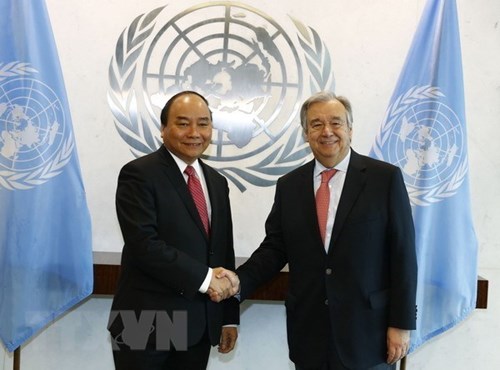The Vietnamese delegation will emphasize its message to call for strengthened global partnership for a world of peace, justice and sustainable development for all people, which will highlight the importance of compliance with international law, prevent and peacefully settle disputes, no use or threat of use of force.
    |
 |
|
Prime Minister Nguyen Xuan Phuc (L) and UN Secretary General Antonio Guterres at a meeting in 2017 |
Vietnam will also stress the necessity to promote multilateralism and a global partnership with shared responsibility; to make the UN stronger, more democratic and effective; and to ensure adequate resources for UN operations, especially its support for developing countries.
Vietnam’s participation in the important event aims to reaffirms the country’s consistent foreign policy of independence, self-reliance, peace, cooperation and development; multilateralization and diversification of external relations, proactive international integration, and its role in multilateral cooperation mechanisms.
Vietnam officially joined the UN on September 20, 1977, and since then the country’s relationship with the global organisation has been growing.
It has actively cooperated with non-aligned and developing countries to fight for and protect fundamental principles of the UN Charter, such as those on sovereign equality, non interfere in other countries' internal affairs, not use or threaten to use force, and protect the interests of developing countries, including Vietnam.
During the process of Vietnam’s industrialization and modernization, the UN has actively supported the country to successfully implement its socio-economic development goals and become one of the states that completed the UN Millennium Development Goals (MDGs).
The UN’s assistance for Vietnam focuses on promoting sustainable poverty reduction, protecting the environment, adapting to climate change and rising sea level, training human resources, building institutions and fostering gender equality.
At the same time, the UN has also made valuable contributions to improving Vietnam’s production techniques and capacity, the quality of human resources serving development of sci-technology, and addressing other social issues in Vietnam.
Vietnam has taken advantage of the UN as a forum for strengthening relations with its organizations and expanding bilateral and multilateral relations with other countries and international organizations.
Vietnam fulfilled its role as a non-permanent member of the UN Security Council for the 2008-2009. This was the first time Vietnam had got involved in the most important body of the UN for international peace and security.
Vietnam actively negotiated and became a full member of the Chemical Weapons Convention (CWC) in 1998. It also entered negotiations and was one of the first countries to sign the Comprehensive Nuclear-Test-Ban Treaty in 1996, and became a member of the Conference on Disarmament in 1996.
The country is also fully and practically involved in the UN's policy-making mechanisms, and it was also highly voted in many UN agencies, especially the UN Security Council for the 2008-2009 term, the UN Economic and Social Council in 1998-2000 and 2016-2018 tenures, the UNESCO's Executive Board (2015 - 2019), and the UN International Law Commission (2017 - 2021).
Vietnam has actively joined efforts to promote human rights in the world and proposed a resolution on the impact of climate change for children's rights. The country also introduced and participated in many initiatives such as protecting the right to work of disabled people, ensuring a safe working environment for workers at sea, enhancing education and combating trafficking of women and girls.
Thanks to its dynamic, active and proactive participation, Vietnam is credited as ASEAN coordinator at the UN Human Rights Council.
Vietnam has actively participated in the building and implementing of international treaties, as well as contributed to joint efforts to promote the UN’s role as a just and effective global multilateral institution, in order to meet the general aspirations of the mankind.
The cooperation between Vietnam and the UN is a good example of development cooperation among UN member countries, as well as the role of the UN in promoting international cooperation to address economic, social, cultural and humanitarian issues.
In June 2014, Vietnam sent its forces to participate in UN peacekeeping operations. The country has so far sent 27 military officers and is preparing to send a second-level field hospital to participate in the work.
At a meeting of the Asia-Pacific Group at the UN, member countries agreed to select Vietnam as the only candidate of the Asia-Pacific region for a non-permanent seat at the UN Security Council (UNSC) for the 2020-2021 tenure. This demonstrates the support for and trust of the regional countries in the role and capacity of Vietnam.
On July 5, 2018, a new common Strategic Plan for the 2017- 2021 period was signed between the Vietnamese Government and the 18 UN agencies. This is an important milestone highlighting the strong commitment of the UN and Vietnam in the National Action Programme to implement the Agenda for sustainable development until 2030.
Source: VNA